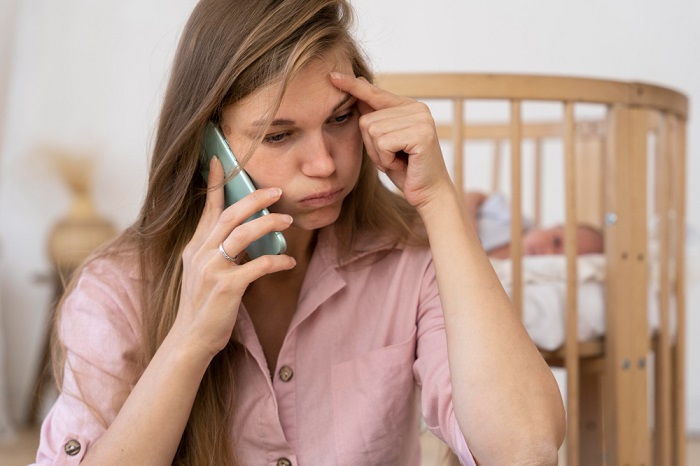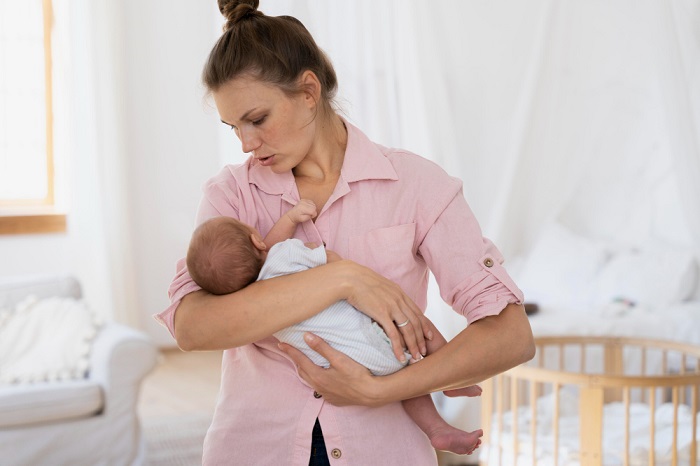When we think about postpartum anxiety, we are referring to anxiety that happens in the first year after a baby is born. However, another important term to understand is perinatal anxiety, which refers to anxiety that happens during pregnancy or postpartum. In both scenarios, anxiety can happen to parents who give birth as well as support partners who didn’t give birth.
Perinatal and postpartum anxiety can be triggered by trauma during the pregnancy, labor, or delivery, or the birthing person’s or baby’s medical complications, hardships at home, going back to work, weaning from breastfeeding, significant difficulties with something like feeding or sleeping, among many other life stressors.
What Does Postpartum Anxiety Feel Like?
As many as 20% of all new parents (remember, that includes those who give birth and those who don’t) experience significant anxiety during pregnancy and postpartum. Anxiety can look different for everyone.
Sometimes it may feel like all you do is worry about your baby’s health and safety to the point that it robs you of everyday joys. Other times, you may feel angry and irritable towards others, including your partner. You may even be experiencing panicky feelings like a racing heart and trouble breathing. Often, these anxiety symptoms come with poor sleep, and the exhaustion snowballs, making everything else feel so much worse. The weight can be crushing.
Do you feel like you are…
- always worried about your baby (for example, about their health or safety)?
- worried about always making the best parenting choices all the time?
- having trouble controlling your worries and thinking about them all the time?
- often angry, agitated, and irritable?
- often restless and feel on edge?
- having trouble concentrating and focusing?
- often fatigued but have trouble falling or staying asleep?
- having physical symptoms that aren’t due to a medical issue including feeling very tense and like your heart is racing, shortness of breath, or headaches, body aches, and upset stomach?
Where Does Postpartum Anxiety Come From and Why Does it Happen?
First, know that it is a universal experience, and it is not your fault. Though expressed differently in different cultures around the world, research showed that anxiety during pregnancy and postpartum are seen internationally.
Second, it most likely comes from the intersection of your own biology, psychology, and social factors.
Postpartum Anxiety Treatment

Significant anxiety may impair how well you’re able to function in your day-to-day life. On top of that, it may impair how much happiness and connection you’re able to feel with your baby and other loved ones.
Worrying about something that hasn’t happened yet or attempting to prepare and over prepare for things that might happen in the future leads to mental overload, burns you out, and is the thief of your joy.
If that list of symptoms above resonated with you, what you may be experiencing is anxiety. The good news is that there are evidence-based interventions available and with the right support, you will be well and feel like yourself again. At Unpolished Parenthood, you will find gold-standard techniques including cognitive-behavioral therapy, mindfulness, and a reflective, interpersonal style.
Try this at home
- Recognize what’s happening. Put a name and a label on how you feel. Although thoughts and feelings are very intertwined, try to separate and label the feeling and then describe the thought that is leading to that feeling.
- Evaluate and reframe. Many of the worries we have as parents really are valid. However, even when the anxious thought is valid, the conclusion of that thought may be falsely distorted (in other words—you are imagining the absolute worst-case scenario). Ask yourself:
- How likely is this to happen?
- What evidence do I have that this will happen?
- What evidence do I have that this will not happen?
- What is more likely actually to happen?
- If I can’t control this thing at this moment, what is a better use of my time and energy right now?
- Practice mindfulness. The more time we spend fighting our thoughts and feelings, the more we get stuck in them. Cultivating a mindfulness practice can help significantly reduce anxiety. To get started, try:
- bringing awareness to your breathing,
- feeling exactly where your body is right now and the ground beneath you,
- counting your breaths or choosing a word or mantra to repeat as you exhale,
- engaging your senses (what are you seeing, hearing, smelling, tasting, and touching at this moment?), and
- noticing your feelings and thoughts from a neutral perspective without judging them and without judging or blaming yourself.
If the anxiety feels like too much to handle on your own and you could benefit from more support, contact Unpolished Parenthood to get started today.
Dr. Ellen Kolomeyer from Unpolished Parenthood provides perinatal depression treatment in Plantation and virtual services to clients all over Florida. If you haven’t been feeling quite like yourself, get in contact at 305-619-3264 or message us now.

